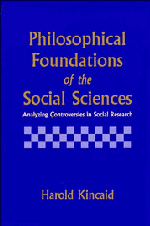Book contents
- Frontmatter
- Contents
- List of figures
- Acknowledgments
- Preface
- Chapter 1 Issues and arguments
- Chapter 2 Challenges to scientific rationality
- Chapter 3 Causes, confirmation, and explanation
- Chapter 4 Functionalism defended
- Chapter 5 The failures of individualism
- Chapter 6 A science of interpretation?
- Chapter 7 Economics: a test case
- Chapter 8 Problems and prospects
- References
- Index
Chapter 3 - Causes, confirmation, and explanation
Published online by Cambridge University Press: 05 June 2012
- Frontmatter
- Contents
- List of figures
- Acknowledgments
- Preface
- Chapter 1 Issues and arguments
- Chapter 2 Challenges to scientific rationality
- Chapter 3 Causes, confirmation, and explanation
- Chapter 4 Functionalism defended
- Chapter 5 The failures of individualism
- Chapter 6 A science of interpretation?
- Chapter 7 Economics: a test case
- Chapter 8 Problems and prospects
- References
- Index
Summary
This chapter begins the argument for a science of society. I argue that the social sciences can produce well-confirmed causal explanations and laws. No inherent conceptual obstacles prevent the social sciences from providing good causal explanations. Nor are there any insurmountable practical obstacles either. Complications abound, of course, but some good social research manages to overcome those difficulties as well as good work in the natural sciences.
My major concern shall be to defend causal explanations rather than laws. Although I think laws play a secondary role in good science, it is important for my overall argument to defend laws as well. Not all philosophers share my skepticism about unificationist accounts of explanation; they will think laws important because they unify. Furthermore, though the exact role of laws in confirmation is also controversial, prima facie laws seem to play an important role in testing. Finally, I shall argue later that in practice there is no very important difference between laws on the one hand and generalizations on the other. So defending causal explanations and defending causal laws naturally shade into each other.
The chapter is organized as follows: Section 3.1 takes on conceptual arguments coming from Searle, Davidson, Taylor and others. After disposing of those objections, Section 3.2 examines a much more serious and practical obstacle to causal laws – the fact that most alleged social laws are qualified ceteris paribus. Generalizations with open-ended escape clauses look unfalsifiable and unexplanatory.
- Type
- Chapter
- Information
- Philosophical Foundations of the Social SciencesAnalyzing Controversies in Social Research, pp. 58 - 100Publisher: Cambridge University PressPrint publication year: 1995



